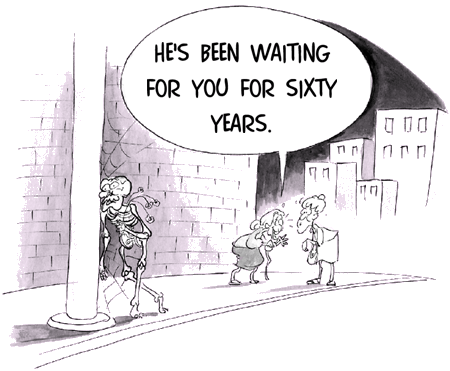Ou seja, não fazem referência a nenhuma pessoa, lugar ou objeto específico. Por esse motivo, são chamados de indefinidos.
Eles podem ser:
- Indefinite Adjectives (pronome adjetivo) - quando qualificam os substantivos.
Vamos verificar suas situações de uso:

Calma, não é tão difícil...
1 - SOME - Algum, algo, alguns, alguma, algumas, um, uns, uma, umas, um pouco de:
- Todos os pronomes "some" e seus compostos podem ser um pronome adjetivo ou um pronome substantivo.
- Usado em frases afirmativas;
- Usado em frases interrogativas quando se trata de um oferecimento ou pedido, ou quando se espera uma resposta positiva.
Exemplos: She was hot and I gave her some water.
(Ela estava com calor e eu lhe dei um pouco de água.)
I prefer to forget some things that happened in the past.
(Prefiro esquecer algumas coisas que aconteceram no passado.)
(Prefiro esquecer algumas coisas que aconteceram no passado.)
Some exercises are difficult to do.
(Alguns exercícios são difíceis de fazer.)
Would you like some tea?
(Você gostaria de um pouco de chá?)
2 - SOMEBODY/SOMEONE - Alguém
Exemplos: Somebody is knocking the door.
(Alguém está batendo na porta.)
Someone is knocking the door.
(Alguém está batendo na porta.)
3 - SOMETHING - Alguma coisa, algo:
Exemplos: There is something under the bed.
(Há/Tem alguma coisa embaixo da cama.)
I gave her something to drink.
(Eu dei a ela algo para beber.)
(Há/Tem alguma coisa embaixo da cama.)
I gave her something to drink.
(Eu dei a ela algo para beber.)
4 - SOMEWHERE - Em algum lugar:
Exemplos: I saw your keys somewhere.
(Eu vi suas chaves em algum lugar.)
My book should be somewhere in this classroom.
(Meu livro deve estar em algum lugar nesta sala de aula.)
(Meu livro deve estar em algum lugar nesta sala de aula.)
5 - SOMEHOW - DE ALGUMA MANEIRA, DE ALGUM JEITO
Exemplo: I must get a job, somehow I will get what I want!
(Eu preciso de emprego. De alguma maneira conseguirei o que quero!)
(Eu preciso de emprego. De alguma maneira conseguirei o que quero!)
6 - ANY - Algun, alguns, alguma, algumas nenhum, nenhuma, um, uns, uma, umas, qualquer.
- Todos os pronomes "Any" é usado em frases interrogativas e negativas.
- Frases afirmativas é usado quando: aparecer após a palavra if; significar qualquer;
- Quando houver uma palavra de sentido negativo na frase como seldom, never, rarely, without, etc.
- Este pronome, assim como some, pode ser um pronome adjetivo (indefinite adjective) ou um pronome substantivo (indefinite pronoun)
Exemplos: Do you have any talent for dance?
(Você tem algum talento para a dança?)
He didn't have any chance.
(Ele não tinha chance alguma.)
If you have any doubt, ask me.
(Se você tiver qualquer / alguma dúvida, pergunte-me.)
I don't have any money on me today.
(Não tenho dinheiro algum comigo hoje.)
Take any book you need.
(Pegue qualquer livro que precisar.)
She rarely has any free weekend.
(Raramente ela tem algum fim de semana livre.)
(Raramente ela tem algum fim de semana livre.)
7- ANYBODY / ANYONE - Alguém, qualquer um, ninguém
Exemplos: There isn't anybody upstairs.
(Não há ninguém lá em cima.)
Is there anybody home?
(Há alguém em casa?)
8 - ANYTHING - Alguma coisa, qualquer coisa, nada
Exemplos: I am hungry because I didn't eat anything this morning.
(Estou com fome porque não comi coisa alguma / nada hoje de manhã.)
There isn't anything to do in this city.
(Não há coisa alguma / nada para fazer nesta cidade.)
He may buy anything he wants.
(Ele pode comprar qualquer coisa que quiser.)
9 - ANYWHERE - Em algum lugar, em qualquer lugar
Exemplos: Did you see him anywhere?
(Você o viu em algum lugar?)
Your shoes must be anywhere.
(Seus sapatos podem estar em qualquer lugar.)
10 - ANYWAY - DE ALGUMA MANEIRA, DE QUALQUER JEITO
Exemplos: Please, don't tell me what I have to do, anyway, I will only do what I want.
(Por favor, não me diga o que tenho que fazer, de qualquer maneira, farei apenas o que quero.)
I will buy the house anyway.
(De qualquer jeito, comprarei a casa.)
11 - NO (Pronome Adjetivo) - Nenhum, nenhuma
Exemplo: I have no money in my wallet.
(Não tenho dinheiro nenhum na minha carteira.)
12 - NONE (Pronome Substantivo) - NENHUM, NENHUMA
Exemplos - Do you have any poetry book?
- No, I have none.
(Você tem algum livro de poesia?)
(Não, não tenho nenhum.)
13 - NOBODY / NO ONE - Ninguém
Exemplos: Nobody/No one knows what our secret is.
(Ninguém sabe qual é o nosso segredo.)
Nobody/No one knows him.
(Ninguém o conhece.)
14 - NOTHING - Nada
Exemplos: I have nothing to say.
(Não tenho nada a dizer.)
There was nothing in the fridge.
(Não havia nada na geladeira.)
15 - NOWHERE - Nenhum lugar
Exemplos: She is nowhere in this park.
(Ela não está em lugar nenhum deste parque.)
16 - EVERY - Cada, outro, outros, outra, outras
- são utilizados em frases afirmativas ou interrogativas.
- são utilizados em frases afirmativas ou interrogativas.
17 - EVERYBODY - Toda a gente, todo mundo
Exemplo: Everybody I know prefers chocolate to vanilla.
(Todo mundo que eu conheço prefere chocolate a baunilha)
18 - EVERYONE - Todos, todo o mundo
Exemplo: Everyone wants to come to the party.
(Todos querem ir à festa)
19 - EVERYTHING - Tudo
Exemplo: Everything is possible.
(Tudo é possível)
20 - EVERYWHERE - em todos os lugares
Exemplo: God is everywhere.
(Deus está em todos os lugares)
21 EVERY WAY - de todo o jeito, todos os sentidos
Exemplo: The new system is functioning perfectly in every way.
(O novo sistema está funcionando perfeitamente em todos os sentidos)
I don't have any money on me today.
Além desses, há outros pronomes indefinidos muito utilizados na língua Inglesa que você conhecerá em um próximo post.
Bons estudos.
OBSERVAÇÕES:
A Língua Inglesa não admite dupla negativa nas orações, coisa muito comum e, às vezes, obrigatória em nosso idioma.
Exemplos: Não tenho nada a dizer.
(I have nothing to say.)
Não há coisa alguma para fazer nesta cidade.
(There isn't anything to do in this city)
I don't have any money on me today.
(Não tenho dinheiro nenhum comigo hoje.)
I have no money on me today.
(Não tenho dinheiro nenhum comigo hoje.)
Além desses, há outros pronomes indefinidos muito utilizados na língua Inglesa que você conhecerá em um próximo post.
Bons estudos.




